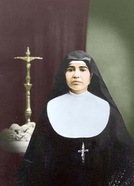
Eusebia Palomino Yenes was born on 15 December 1899 in Cantalpino, Spain, one of four children to Agustin Palomino and Juana Yenes. Her father worked as a seasonal farmhand, and during winter months when there was no work, he was forced to travel to nearby villages to beg for food, with the little Eusebia at his side. Overjoyed to be in her father's company, she was too young to understand his humiliation in asking for "a loaf of bread, for the love of God". When Eusebia was 8 years old, she made her first "encounter" with Jesus in the Eucharist and felt called to belong forever and completely to him. A short time later, she was forced to leave school and work to help the family.Although she was young, she showed unusual maturity in caring for other young children, and when she was 12 she went to Salamanca with her older sister and worked as a nanny. Her love for God continued to grow and was expressed so well through the care she gave to the children.
Daughters of Mary
Every Sunday afternoon, Eusebia went to the Oratory at the "Sancti Spiritus" School run by the Daughters of Mary Help of Christians; here she got to know the Sisters. Noting her maturity and responsibility, they asked if she could volunteer her time to help them.
She was immediately available to begin her "mission" and helped the Sisters in the kitchen, collecting firewood, cleaning the school, accompanying the students and running errands. She was always ready to "give a hand" and to transmit a joyful and simple spirit of service to those around her.
"Something deeper' in Eusebia
The students perceived that in Eusebia there was "something deeper" behind her habitual smile and simple way, and they found "excuses" to be with her, receiving counsel and comfort through her words and by her presence. But more than words, it was her life and simple way that spoke to the girls.
Although Eusebia's secret desire was to become a "Daughter of Mary", she did not ask to enter the Congregation because she was afraid she would be refused due to lack of money, resources and education.
She hoped, however, that "if I carry out well my duties here, for love of the Blessed Virgin, one day I will be her daughter in the Congregation". She confided this desire on one occasion to a visiting superior, who told her to "worry about nothing". In name of the Mother General, she accepted Eusebia.
On 5 August 1922 Eusebia began her novitiate and made her religious profession two years later, when she was transferred to the house of Valverde del Camino in southwestern Spain.
Not up to expectations
Upon her arrival the first day, she was openly derided by the youngsters of the school and oratory: she was "little, pale and ugly, with hands that are too big... plus, she has a dumb name", and obviously not what they expected.
Sr Eusebia, however, who felt like a "queen" living forever in the mansion of Jesus her King, remained indifferent to the unkind remarks. She began the next day to "roll up her sleeves" and to carry out her assigned duties: the kitchen, the laundry, answering the door, working in the garden and keeping company with the children at the oratory.
It was not long before the children were "taken up" by the stories she would tell them of the lives of the saints and of missionaries as well as anecdotes of St John Bosco; Sr Eusebia had an excellent memory and the gift of storytelling. Little by little, those who at first had judged and criticized her felt that there was something truly special about the nun and that she really cared about them.
Even outside of the oratory, the parents of the children, other adults and youth, seminarians and even priests sought out her "spiritual counsel". Although Sr Eusebia had no education in theological doctrine, her heart was full of God's wisdom and she made time for everyone.
Victim for the salvation of Spain
In the beginning of the 1930s, tensions and persecutions against the Catholic Church began in Spain, and Sr Eusebia once again made herself "available" to help. This time, she offered herself as a victim to God for the salvation of Spain.
Her offer was accepted and in August 1932 a mysterious illness struck her. Doctors were unable to diagnose this disease which was causing the limbs of her body to wind up, turning her into a "ball of yarn". Her asthma, which had always been "mild", had now worsened and added to her suffering.
Although the pain was excruciating, Sr Eusebia was always a gentle channel of joy and peace, treating those around her with great respect and appreciating those who took care of her.
Sr Eusebia died on 10 February 1935.
The echo of voices of the townspeople of Valverde could be heard following her departure: "A saint has died".
Taken from www.VATICAN.va

 RSS Feed
RSS Feed
